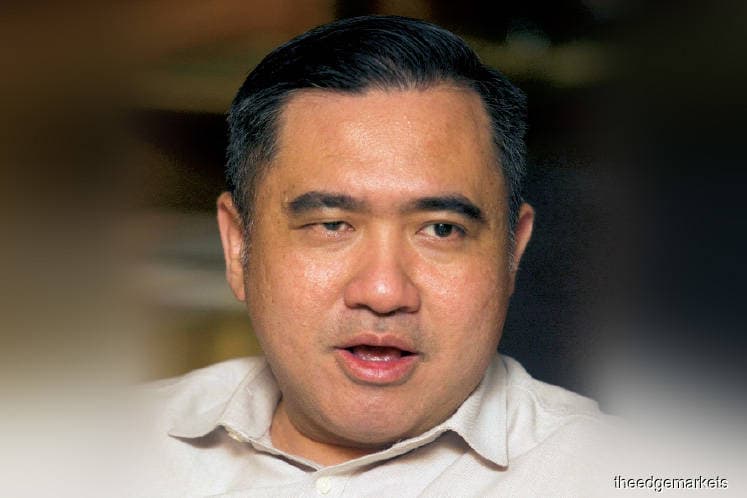
This article first appeared in The Edge Financial Daily on September 4, 2019
SERENDAH: Transport Minister Anthony Loke Siew Fook said the lowering of passenger service charge or PSC for international travellers flying beyond Asean from klia2 and other airports, other than the Kuala Lumpur International Airport (KLIA), is “not temporary”, and “should not be disputed”.
“It is not temporary. When it (PSC cut) was announced by the government, it should not be disputed as we made this decision at the cabinet level, [it was] not by the minister of transport,” he told reporters yesterday after the launch of the second phase of the Klang Valley Double Track (KVDT2) rehabilitation project.
Announced by Loke last Friday, the reduced PSC that would take effect from Oct 1 is to mitigate the imposition of the departure fee on passengers leaving Malaysia — which ranges from RM8 to RM150 per passenger, depending on the destination and seat class.
However, confusion arose as the Malaysian Aviation Commission (Mavcom) issued a statement later that day, which stresses that its role under the Malaysian Aviation Commission Act 2015 is to determine how the PSC is calculated and the rate at which it is charged. The PSC has been under review by Mavcom as part of the Regulated Asset Base (RAB) Framework since 2017.
“The commission is in the final stages of completing the exercise. The new rates will be announced in the next few weeks and gazetted for implementation effective January 2020,” Mavcom said. It also said the RAB mechanism is globally recognised, and that one outcome will be differentiated charges based on the size, facilities and services provided at each airport.
Loke, meanwhile, further said yesterday that the right to fix the PSC rates lies with the government as it owns all the airports in the country, while MAHB is the operator tasked to run these assets.
He also explained that any new PSC rate to be announced by Mavcom, which was set up to regulate economic and commercial matters relating to civil aviation in 2016, will be a statutory rate.
Loke also stressed that the PSC cut will not affect MAHB’s earnings because the difference will be offset by the user fee that MAHB pays to the government.
“The moment we reduce the PSC for certain airports, klia2 [except KLIA] for international departures, whatever difference in terms of revenue will be offset through [lower] user fees,” he said, adding that the lower PSC will allow the airports to operate more competitively, as well as encourage more tourists to visit and fly through Malaysian airports.
theedgemarkets.com wrote last Friday, quoting analysts, that under the operating agreement MAHB signed with the government 10 years ago, the airport operator is entitled to a benchmark PSC. So if the PSC charged is below the benchmark rate, MAHB can recover the difference by paying a proportionally lower user fee to the government.
Last year MAHB registered 99.03 million passenger movements in all airports it operated, 60.55% (or 59.96 million) of which were in KLIA and klia2, according to statistics provided by MAHB. klia2 alone accounted for 31.86 million or 32.17% of the tally, while KLIA contributed 28.10 million or 28.38%.
Among the 99.03 million passengers, some 26.18 million of them (or 26.4%) were international travellers bound for non-Asean destinations. The number of international travellers using KLIA was 13.98 million (or 53.4%), while the remaining 12.2 million (46.6%) were using other airports, including klia2.
Dhaya Maju LTAT to complete 265km KVDT2 rehabilitation in five years
As for the planned RM4.475 billion KVDT2 rehabilitation project, it will now involve 265km of KTM Bhd’s railway tracks instead of the earlier announced 110km.
The project, undertaken by Syarikat Dhaya Maju LTAT Sdn Bhd, entails the rehabilitation of the Salak South-to-Seremban stretch (150km), the Simpang Port Klang and Port Klang stretch (114 km), and the Simpang Pelabuhan Klang By-Pass (1.5km), Loke said.
Loke announced in July that Dhaya Maju LTAT — an 80:20 joint venture between privately held construction company Dhaya Maju Infrastructure (Asia) Sdn Bhd and Lembaga Tabung Angkatan Tentera (LTAT) — has won back the KVDT2 rehabilitation contract, 10 months after it was terminated, and that the contract’s value has been lowered by 15% from the original RM5.26 billion.
Loke told reporters yesterday that the decision to re-award the project to Dhaya Maju LTAT, who is also the contractor for the first phase or KVDT1, was made after considering that it is a local company and that the choice will enable the rehabilitation of KVDT2 to benefit from the investments made in KVDT1 — like machinery and skilled labour.
According to Dhaya Maju LTAT, KVDT1 is on track to be delivered next year, with rehabilitation works as at end-August at 80.3% completion. As for KVDT2, 20% to 30% of the preparatory works are done.
Notwithstanding the cost-cutting, Loke said the KVDT2 rehabilitation may be completed in five years instead of the targeted seven years.
“Seven years is the maximum timeline [given by the government], but it does not mean we need to wait for seven years [to complete the works for the KVDT2]. That timeline takes into consideration that the contractor can only work during the trains’ off time and to reduce the government’s cost burden.
“They (Dhaya Maju LTAT) expect the KVDT2 rehabilitation works to be completed in five years. The government will monitor the progress. If the country’s economy continues to strengthen, we will consider speeding up the process,” Loke added.
He also gave assurance that the lower contract price will not jeopardise the project’s work quality, and that the critical job scope remains as it is. “Several job scopes that are not important have been taken off, which include the upgrading of 10 stations along the route, as it will be taken over by Perbadanan Aset Keretapi,” he said.